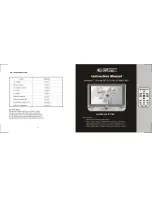
6
Towing a trailer requires care! Both the trailer and vehicle must be in good condition and securely fastened
to each other to reduce the possibility of an accident. Also, some states require that large trailers be
registered and licensed. Contact your local Department of Transportation office to check on license
requirements for your particular unit.
•
Check that the hitch and coupling on the towing vehicle are rated equal to, or greater than, the trailer's
“gross vehicle weight rating” (GVWR).
•
Check tires on trailer for tread wear, inflation, and condition.
•
Inspect the hitch and coupling for wear or damage.
NEVER
tow trailer using defective parts!
•
Make sure the trailer hitch and the coupling are compatible. Make sure the coupling is securely fastened
to the vehicle.
•
Connect safety chains in a crossing pattern under the tongue and attach the breakaway cable
TO THE
REAR BUMPER OF THE TOWING VEHICLE.
Do not attach the cable to the trailer hitch.
•
Make sure directional and brake lights on the trailer are connected and working properly.
•
Check that lug nuts holding wheels are tight and that none are missing.
•
Maximum recommended speed for highway towing is 45 mph. Recommended off-road towing speed
is not to exceed 10 mph or less depending on terrain.
Before towing the trailer, check that the weight of the trailer is equal across all tires. On trailers with
adjustable height hitches, adjust the angle of the trailer tongue to keep the trailer as level as possible. On
units equipped with a tandem axle trailer, a large angle between the trailer and tow vehicle will cause more
weight to be carried by one axle, which could cause premature wear on the tires and axles and cause
potentially unsafe operating conditions.
The trailer is equipped with hydraulic surge brakes or electric surge brakes. Check the operation of the
brakes by braking the vehicle at a slow speed before entering traffic. Both the trailer and the vehicle should
brake smoothly. If the trailer seems to be pushing, check the level in the surge brake fluid reservoir.
When towing, maintain extra space between vehicles and avoid soft shoulders, curbs and sudden lane
changes. If you have not pulled a trailer before, practice turning, stopping, and backing up in an area away
from heavy traffic.
A film of grease on the coupler will extend coupler life and eliminate squeaking. Wipe the coupler clean
and apply fresh grease each time the trailer is towed.
TOWING SAFETY
REPORTING TRAILER SAFETY DEFECTS
If you believe your trailer has a defect which could cause a crash or could cause injury or death, you should immediately
inform the National Highway Traffic Safety Administration (NHTSA) in addition to notifying Magnum Products LLC.
If NHTSA receives similar complaints, it may open an investigation; and if it finds that a safety defect exists in a group
of vehicles, it may order a recall and remedy campaign. However, NHTSA cannot become involved in individual
problem between you, your dealer, or Magnum Products LLC.
To contact NHTSA, you may either call the Auto Safety Hotline toll-free at 1-888-327-4236 (TTY:1-800-424-9153),
go to http://www.safercar.gov; or write to:
Administrator
NHTSA
1200 New Jersey Avenue S.E.
Washington, DC 20590
You can also obtain other information about motor vehicle safety from http://www.safercar.gov.







































